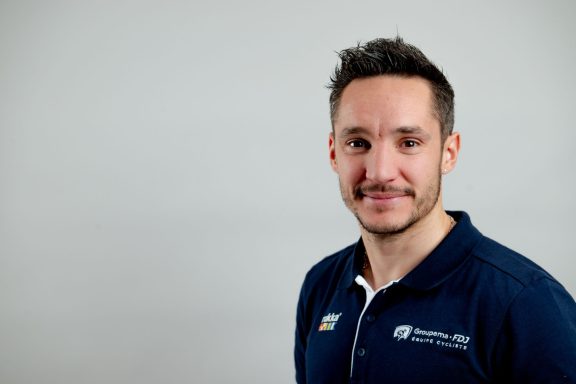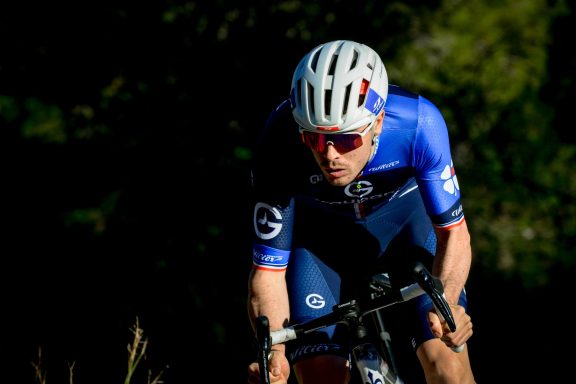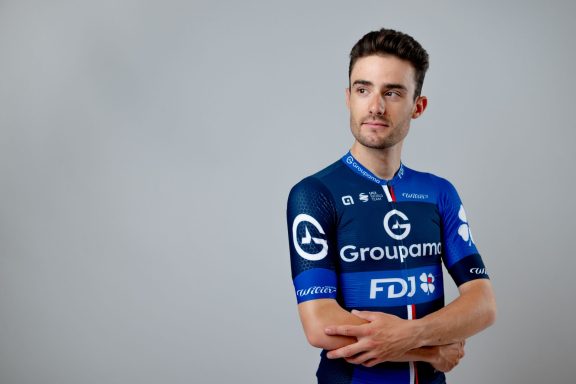He may be Swiss, and quite proud of it, almost everything about Johan Jacobs brings us back to Belgium. From his original family and the one he founded, to his passion, his job, and even his first name. On the Belgian opening weekend, he is basically at home. The perfect opportunity to learn more about the man who will celebrate his 28th birthday on the Omloop Het Nieuwsblad.
So, the first name. Officially, and to this day, nothing has been confirmed by the persons involved, but Johan Jacobs has no illusions about its origins, and jokes about it joyfully. “Six months before I was born (1 March 1997, editor’s note), the world cycling championship took place in Switzerland, in Lugano, and Johan Museeuw was the winner,” he recalls. “In my opinion, it’s not a coincidence. If you ask my father, he will continue to say that it’s not related, but I’m sure that’s why they thought of this particular name. I don’t think it was even on the shortlist before that (smiles).” In addition to being a true cycling fan, his father has the same nationality as the “Lion of Flanders”. He actually met his future wife in Belgium, before following her to Switzerland, where their child grew up, raised by two cultures. “At school and in my free time, it was 100% Swiss,” he says. “I grew up in a small village where there were more cows than inhabitants. It was the proper Swiss countryside, but my parents’ house was like a small Belgian island in the middle of this countryside.”
“For me, the cobbled climbs were paradise”
His second culture took shape in this enclave. He would speak with his father in Flemish, the home cooking was mainly Belgian, and the television was also often tuned to Flemish channels. And therefore, very often, to cycling. “We would watch all the Classics on TV, the Ronde van Vlaanderen, Paris-Roubaix,” he explains. “We would also watch cyclo-cross in the winter. I grew up with these races, but I couldn’t really talk about cycling with my friends because it’s not so developed and integrated into Swiss culture. It was more football or skiing. That’s kind of the story of my life: I adapt wherever I go.” As a consequence, when he was visiting his maternal grandmother, not far from Ninove, where the Tour of Flanders used to finish, cycling would quash everything else. “I remember getting my first road bike there, when I was about nine years old,” he recalls. “We bought an aluminium Giant in the T-Mobile colours, in black and pink. My first ride on a road bike was in Belgium, and then every time we would go visit my grandmother, which was three or four times a year, we would take the bike with us.”
That’s how Johan Jacobs discovered the cobbled climbs very early on. “The first one I did in my life, when I was about 10 or 11, must have been the Bosberg, then probably came the Muur van Geraardsbergen,” he says. Later, it was not unusual for him to cover the “last forty kilometres” of the Tour of Flanders with his father. His mother would drop them off by car near Oudenaarde, near the Ronde’s Museum, and they were off for a moment of pure happiness. “It was emotional and exciting to do the same climbs as the pros,” he says. “In Switzerland, we don’t really have cobblestones, and for me, it’s always been a fantasy to ride on it. For some kids, paradise was toy or video game stores. For me, it was the cobbled climbs. That’s where my love for the Classics was born.” However, his favorite discipline was initially cyclocross. His idols were the “muddy” ones, the Belgians in particular. So when he started cycling seriously, he chose this discipline and became successful quite quickly. He proved himself as one of the very best of his generation with a national title in the U17 in 2013. “I wanted to succeed in cyclocross,” he says. “It was my major goal from the junior category onwards.” He partly fulfilled this goal. Johan Jacobs indeed made a name for himself on the international scene in the youth categories, winning a World Cup round in Namur and several races on the other circuits.
The cyclocross disenchantment, the Classics utopia
This led him to sign with a specialized Belgian structure, and a crossman career was within his grasp. “I was considered the great Swiss promising rider, but I perhaps had a little too many expectations of myself,” he says. “I put a lot of pressure on myself. On top of that, I was continuing my education in Switzerland. I was going back and forth to Belgium almost every weekend. Looking back, I think I can say that I suffered a burnout during my second year as a U23. I was doing too much. I was travelling on Friday, racing on Sunday, coming back on Sunday evening, and waking up on Monday at 6am to go to my internship by bike. Then, all week long, I would juggle between my internship and training. I wasn’t performing anymore, and I had really lost the pleasure and love for the sport. I was fed up.” Although his third year as U23 included a few great performances, Johan Jacobs was firmly “ready to stop cycling” as he entered his final season in the category. At the time, he had even started working in a cycling shop. “I said to myself: it’s over,” he says in all honesty. “It was my girlfriend at the time, who is now my wife, who told me: you’re an idiot! Why don’t you try one last year on the road, just for fun? You’ll regret it if you stop now.” I still had the motivation to train, I’ve always loved it, so I listened to her.”
It nevertheless took a very fortunate set of circumstances, and a last-minute free-up spot at Lotto-Soudal U23, for the Swiss to get this “last chance”. At that point, he had no team or real plan after withdrawing from cyclocross in November: “I just wanted to race with my heart and without pressure. My only goal was to have fun”. This change of approach – and discipline – ultimately launched his second career. After a podium in Paris-Roubaix and a top 10 in the Tour of Flanders as a U23, the doors of professional road cycling opened for the 22-year-old. He was then destined to compete in the races he was watching on TV growing up. “I had always considered road cycling as something utopian because it was often said that cyclocross riders did not have the engine to race on the road, even if some have since proven the opposite,” he smiles. “When I realized that I had qualities for the Classics, I didn’t even believe it. When I found myself on the starting podium of the Tour of Flanders for the first time, I had to pinch myself twice to be sure that it was real. I rethought myself as a crossman, at a time when it seemed unimaginable to me that I would one day compete in these races. It was actually never a goal; it was just a dream.” Since 2020, the Winterthur native has competed in five “Ronde” and three Paris-Roubaix. That’s what you call making your dreams come true.
“My Swiss friends call me the Belgian, and my Belgian pals call me the Swiss”
He has also since moved to Belgium. Not to reconnect with his father’s roots, or out of love of the Classics, but “for the real love”. With his partner, the daughter of a former top-level crossman and granddaughter of a former winner of the E3 Classic, he is settled by the sea, near Middelkerke, just twenty-five kilometres from the French border. His training playground? “It’s flat and windy,” he jokes. “I’m not far from “De Moeren”, which is a very well-known area for cyclists because there’s a straight road where the trees lean where the wind blows.” There aren’t many famous Flemish bergs in this region, however, and the Swiss rider is mostly familiar with the Kemmelberg, the major climb of Gent-Wevelgem. “I do the other climbs mainly in races or in recon”, specifies Johan. “I don’t really need to do them so often because I already climbed them fifty times when I was a kid. The roads haven’t changed since then, and all the races are in the same area. It’s not difficult to know the roads by heart if you’ve ridden them dozens of times. Occasionally, I take the car to get closer to this area and train there, but it’s more for fun”. The enjoyment remained unchanged since his first pedal strokes: “I still have the same thrill as when I was ten. When I come to the cobbles and go up the climbs, I’m all excited”.
Nostalgic for the old Tour of Flanders’ route and the Muur-Bosberg sequence, his two favourite climbs, Johan Jacobs only hates one “berg”, and it’s not even Flemish! It’s the Mont Saint Laurent, in the province of Hainaut, which features on Kuurne-Brussels-Kuurne. “It’s horrible, it’s the most hated climb in the peloton,” he claims. “The cobblestones are really bad and that’s on purpose! They’re put upside down so that the cars have “grip” on the descent. And for that reason, it really is a pain to ride on it.” Does his knowledge of the field now match that of a pure Belgian rider? “It’s even better, because I have the Swiss precision to analyse it,” he smiles. His integration also goes far beyond cycling. In a region of West Flanders known for its accent that can be hard to understand, to the point of being subtitled on television, he is completely comfortable. “My girlfriend speaks like that, my friends speak like that as well. For them too, some would need subtitles sometimes, but I don’t”, adds the man who also considers himself to be rather “good at impersonating” the different Flemish accents.
There is no shortage of examples to consider him the most Belgian of Swiss riders. A label that he accepts willingly. “I’m quite ok with this description”, he concludes. “But it’s funny, because when I’m with a group of Swiss friends, I will always defend Belgium, support the Belgians, and if I’m with a group of Belgians, I will always choose Switzerland. Maybe it’s because my Swiss friends call me the Belgian, and my Belgian pals call me the Swiss. I’m always a bit of a foreigner (laughs). But in the end, I consider myself more Swiss than Belgian. And actually more Flemish than Belgian.”


